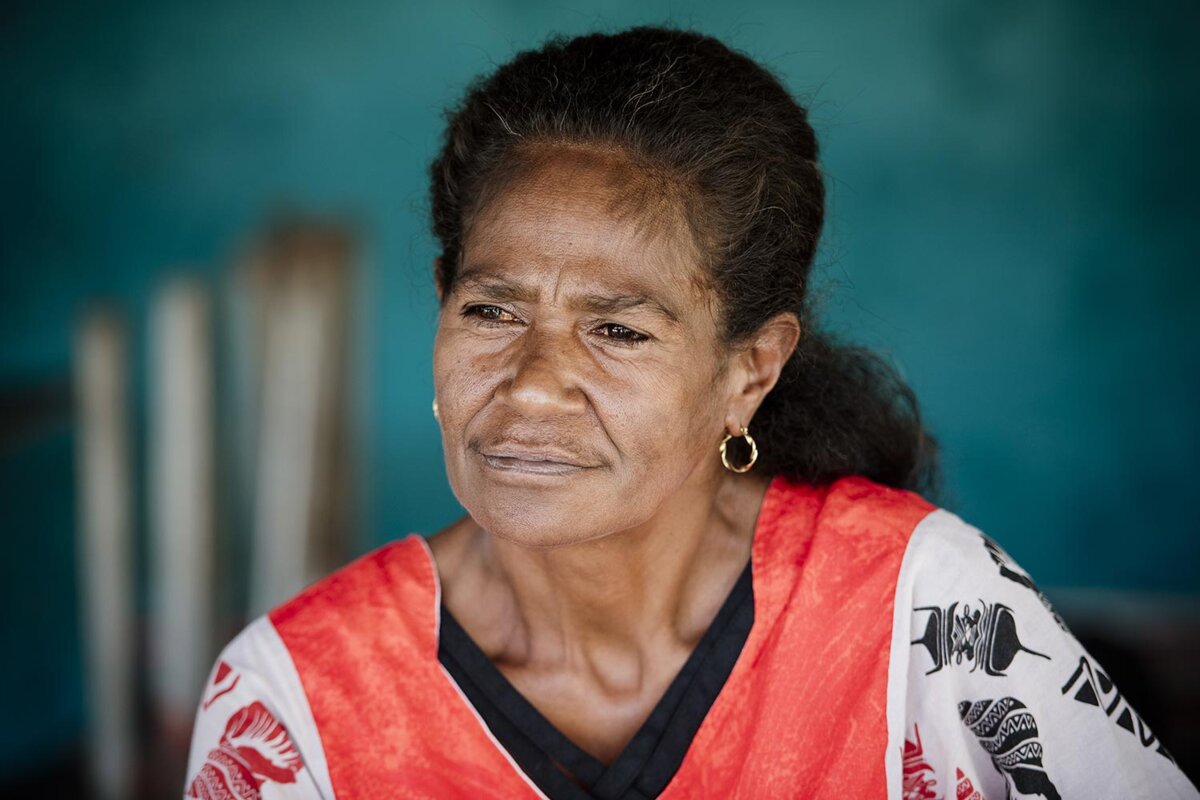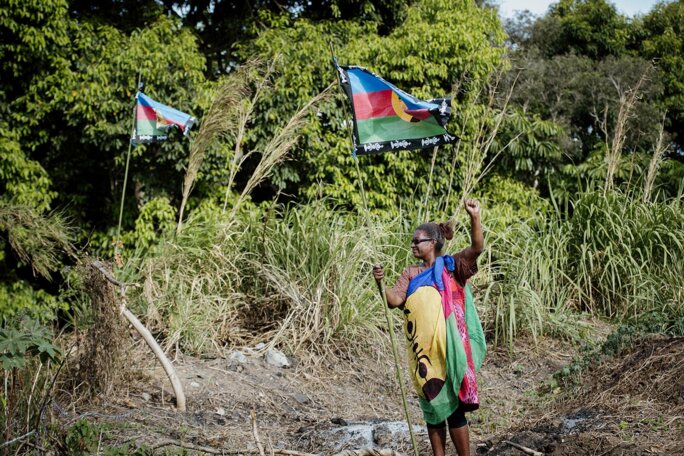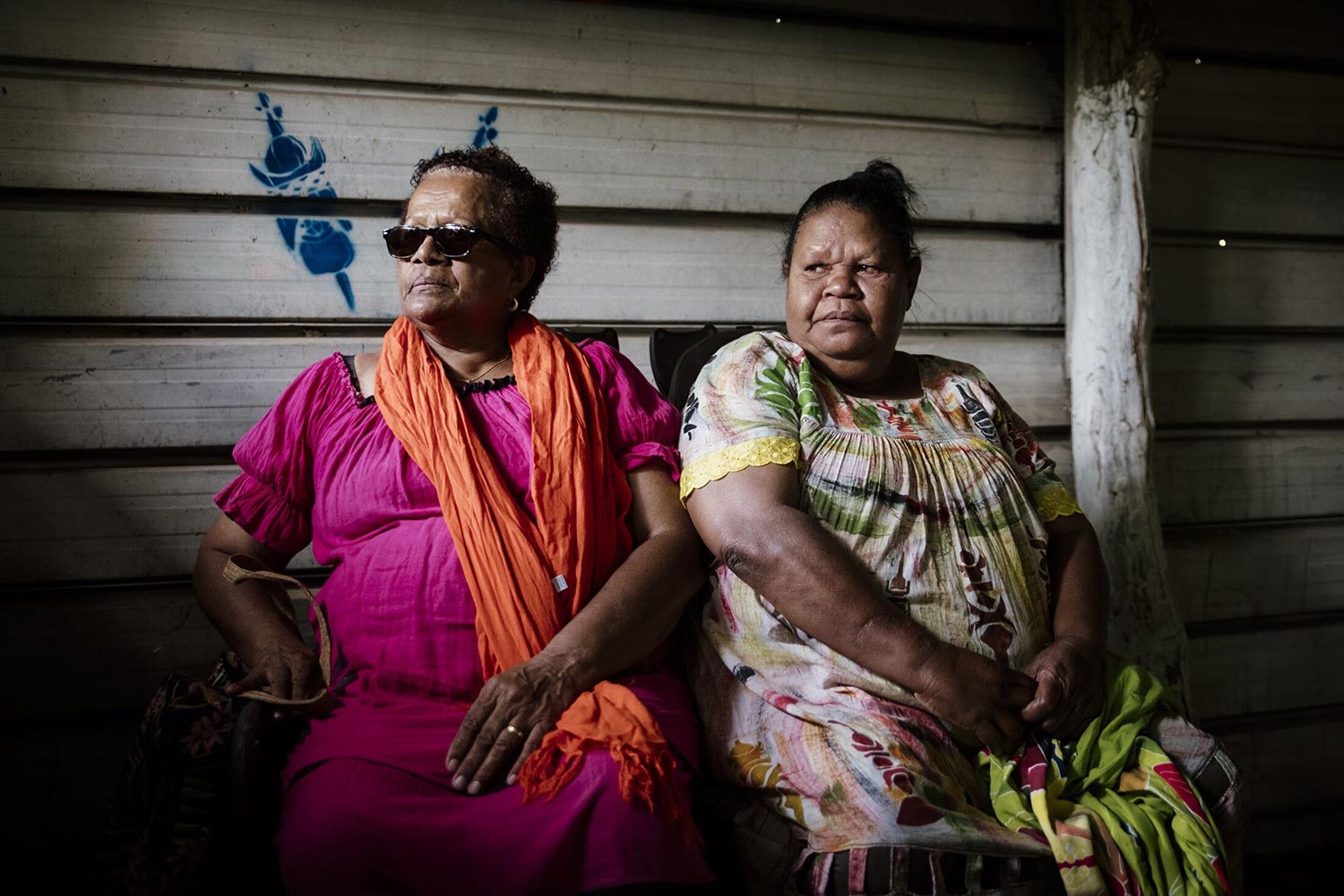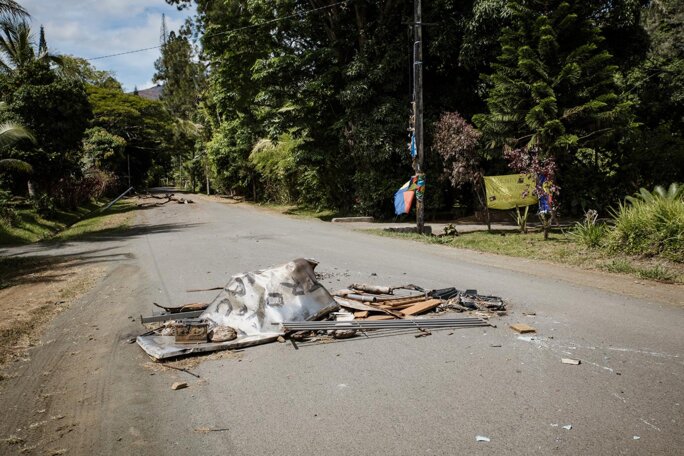Sitting in front of her house sipping a cup of coffee, Marie-Berthe Boano eyed the dirt track that winds its way up to the main road. “I’m waiting for the day when I’ll see him arriving from there,” she said, pointing to the end of the track. Her eyes were humid, but her head was high and her voice even. “I have hatred for what’s happened,” she continued. “I don’t leave here anymore since my brother left. I feel rage. I don’t want to come across any gendarmes again.”
When Mediapart met her in November, she had not once left Saint-Louis, a neighbourhood close to Nouméa, the New Caledonian capital, over the previous five months. For it was five months ago when her nephew, Dimitri, and elder brother, “Bichou”, were put aboard a French military plane to be placed in preventive detention on mainland France, 17,000 kilometres away.
“Bichou”, whose real name is Christian Tein, is the new president of the Kanak and Socialist National Liberation Front (FLNKS), a leftwing alliance of parties of the indigenous Kanak people which seeks independence from France, which has ruled over this south-west Pacific Ocean archipelago since 1853. The French authorities consider Tein to be one of the principal organisers of the Kanak revolt over an electoral reform, and which has shaken New Caldonia since it erupted into violence in mid-May. Until then, the protests had been largely peaceful demonstrations and marches.

Enlargement : Illustration 1

The revolt was sparked by a constitutional reform driven by then French interior and overseas territories minister, Gérald Darmanin, which aimed to undo one of the most important measures introduced in the long and tense process of the decolonisation of the archipelago, namely the freezing of the electoral register as decided in 2007 by then French president Jacques Chirac.
Darmanin’s since abandoned reform of the existing legislation would have allowed those adults who have been resident in New Caledonia for ten years or more, mostly coming from the French mainland, to vote in provincial elections in the archipelago, a move that would inevitably weaken the Kanak parties' share of the vote.
Previously, under the terms that emerged from the so-called Nouméa Accord negotiated principally between the French government and representatives of the Kanak population, those entitled to vote in the provincial elections were restricted to adults who were resident in 1998, and to their children when they reached voting age. This was to give a greater political representation to the indigenous Kanak people, who have become a minority of the total population – which today numbers 271,000 – with the constant arrival since 1853 of settlers of European (and mostly French) origin (nick-named “Caldoches”).
A ‘locked’ neighbourhood
Situated in the larger district of Mont-Dore, about 15 kilometres from Nouméa, in the far south of the archipelago’s largest island, Grande Terre, Saint-Louis is an example of what pro-independence member of France’s parliament Emmanuel Tjibaou, the son of Kanak nationalist militant Jean-Marie Tjibaou, assassinated in 1989, calls “neo-colonial logics”. The neighbourhood and its Kanak tribal population remain subject to a major crackdown by French gendarmerie which, in response to the violent incidents there, have established security roadblocks, called “locks”, where the main road to and from Nouméa enters and exits Saint-Louis.
On May 14th, soon after the Kanak revolt began, a gendarme was fatally shot in the head at Saint-Louis (an investigation into his death is ongoing). Gunfire regularly targeted gendarmes in the area, where dozens of car-jackings took place. It is also where three Kanaks were shot and killed by the gendarmerie’s elite intervention unit, the GIGN; Rock Victorin Wamytan, 38, the nephew of Roch Wamytam, the Kanak tribal chief in Saint-Louis, was shot dead in July. Samuel Moekia 30, and Johan Kaidine, 29, were fatally shot in September. In Saint-Louis, unlike on mainland France, their deaths are very present in conversations.
Remindful for some of the days of the indigénat
At the end of September, five other people gave themselves up to the police a few days after France’s high commissioner for New Caledonia, Louis Le Franc, gave an explicit threat: “I am very determined to reopen the road,” he told French daily Le Monde. We will go and find all those who spread trouble in Saint-Louis. And I have one piece of advice to give them, which is to give themselves up. It is the only way out that will save their lives.”
Since then, the main road has re-opened to traffic during the day, but the gendarmerie maintains a massive presence. On the side of the path that leads to the hut of the chieftaincy, an armoured vehicle is parked well in sight, while the sounds of drones hum daily. The surveillance is at a maximum level, invasive and weighs on the population. “It’s tough,” commented Fernand Dawano, one of the elders of the Kanak tribe at Saint-Louis. “Since the month of May, we’ve stepped back 100 years. We’ve been confined, like during the times of the indigénat,” he said, referring to the laws and regulations targeting indigenous populations in French colonies between 1881 and 1947, and which effectively gave them inferior status.

Enlargement : Illustration 2

Little, apart from the odd pile of debris or a few marks on the asphalt, remains of the Kanak roadblocks that sprung up across the archipelago in the early weeks of the revolt. “We’re keeping up the pressure, we’re keeping our flags [flying],” said Marie-Berthe Boano, pointing out the colourful flags of Kanaky, the name the independence movement gives to New Caledonia.
Less visible than the Kanak men shown in TV news reports wearing balaclavas and mounting bonfires on roadblocks, the Kanak women have always played a key role in supporting their families in pro-independence mobilisations. At Saint-Louis, around 40 women meet together regularly to co-ordinate their actions. “We’re always together,” said Boano, “we meet up at weekends to exchange views. We help each other. We were on the roadblocks, each one bringing along something, keeping the pot boiling.” She added: “We swallowed teargas.”
With Mediapart in tow, Boano attended a meeting of the local branch of the principal pro-independence party, the Union Calédonienne before joining other local women in a communal area called a “nakamal”. Inside, a bingo session was being prepared while attendees sipped on a tea of kava kava, a plant native to the South Pacific islands that has a tranquilizing effect (and which is banned from consumption in mainland France). The women gathered there spoke of their grown-up children, most of whom are currently in detention in the notorious and overcrowded Camp Est prison in Nouméa, while others have been sent to prisons on mainland France.
“It’s too much for us,” was the general sentiment, which was that they wanted to keep up the Kanak cause but in a different manner. “For example, I had difficulty in getting my son to stop,” said one of the women sitting at the table. “He would say to me, ‘Mum, it’s a battle I must wage even to death,’ but we are helpless in face of the state.”

Enlargement : Illustration 3

Marie-Line, a niece of Christian Tein, is the mother of six children. She joined them on the roadblocks this year, just as she was joined on similar protests when she was young. That was in 1984, when she was aged 20, at the beginning of a virtual civil war between Kanak pro-independence militants and their opponents and the French authorities. “We went on roadblocks with a few aunts, helping to burn tyres, gathering stones,” she recalled. “Things got a bit hot, but not like it’s been this year.”
For this year was the first time that these women elders have seen the violence of shops looted, arson attacks on factories and commercial sites, and car-jackings. “It’s another generation,” said Marie-Line. “They’re more turbulent. They tell us, ‘1984 was the time of the oldies, we don’t have the same method’.
“We have a sort of control over the youngsters, but it’s not like it was,” added Marie-Berthe Boano.
Another woman present, Rolande, perched on seating made out of the back seat of a car, said the young generation of 2024 “are more rebellious in their minds”. The grandmother said the daily lives of the young men in Saint-Louis was made up of a mixture of violence, of great social and economic precarity, and a feeling “deep down” of injustice that has hung over their lives. “They never find work, even when they’ve gained qualifications in France,” she observed.
For decades, increasing social inequalities in New Caledonia have fuelled the pro-independence cause.

Enlargement : Illustration 4

Like other elders, Marie-Berthe Boano speaks of the past as if always present. She spoke in the same manner of the fatal shooting of Rock Victorin Wamytan in July and that of Leopold Dawano, 17, “just there, further down” on November 6th 1987 during a gendarmerie operation. “We were on the road,” she recalled. “There was a helicopter just above our heads. They pointed their guns at us, telling us to leave otherwise they’d shoot. My dad told us all to sit down. We didn’t move.”
Nearly four decades later, “nothing has changed” said Boano. “It’s always the same strategy by the state: to come into our homes and smash everything up.” Since May this year, the homes belonging to the Tein family have been the object of several searches by the security forces, which Boano said were rough and traumatising for the children. “I even had a pistol pointed at my temple. It was a Monday morning, they came into the house and made me kneel.” Her brother Gérald asked: “France is at war with who? We aren’t at war.”
Marie-Hélène Dawano, whose nickname is Joly, is the sister of Rock Victorin Wamytan. She took part in all the peaceful demonstrations against the electoral reform that took place before the violent insurrection began in mid-May. She notably joined a pro-independence sit-in organised in April on the place des Cocotiers, a large square in the centre of Nouméa. “It was the first time that I saw the people wake up,” Joly recalled. “I had the shivers.”
Months later, her brother was shot dead by a GIGN sniper, and most of those activists close to her are in prison. “I don’t like Camp Est, but I would have preferred that he went there,” she said of her brother, “rather than lying under the big pine tree in the cemetery.”
In the ruins of the Saint-Louis church, where Rock Victorin Wamytan and his group had set up their headquarters after forcing out the missionaries, the impact of the bullet that first hit him can be seen on a wall. The church and outbuildings were the target of an arson attack shortly after Wamytan’s death. The bullet was retrieved by local youths and a flower was put in its place.
-------------------------
- The original French version of this report can be found here.
This abridged English version by Graham Tearse


